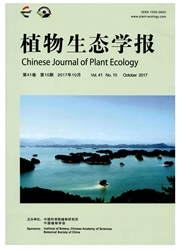

 中文摘要:
中文摘要:
于2004年8月28日至9月6日在长江口水域进行了水文、化学和生物的综合嵌套式外业调查,应用CANOCO4.0软件对获得的浮游植物物种数据和环境因子数据进行了典范对应分析(CCA),并作出了物种、样点分布与环境因子关系的二维排序图.结果表明,长江水人海所带来的泥沙及其形成的营养盐梯度差异是影响这一区域物种分布格局最重要的因素.根据环境因子与排序轴的相关系数,影响这一海区浮游植物分布的主要环境因子依次为透明度、硝酸盐和硅酸盐.主要浮游植物优势种中肋骨条藻(Skeletonema costatum)和细长翼鼻状藻(Proboscia alata f.gracillima)的分布和硝酸盐以及盐度、浊度密切相关,中肋骨条藻适合在低盐度高浊度高硝酸盐浓度的河口水域生存,而细长翼鼻状藻则分布于高盐度高透明度低硝酸盐浓度的开阔海.排序揭示了浮游植物物种对于生态环境的需求以及它们在不同资源维上的生态分化现象.
 英文摘要:
英文摘要:
Aims The Yangtze River Estuary (YRE) faces eutrophication caused by discharge of industrial and agricultural sewage. This leads to frequent harmful algae blooms involving the rapid proliferation of specific toxic species. The aims of our study are to: 1) apply scientific methods and field experiments to clarify the distributional relationship between phytoplankton species and the environment, and 2) provide data on species and environment informative for further research on estuary ecosystem protection. Methods An interdisciplinary survey of hydrological, chemical and biological resources was conducted in the YRE on August 28 - September 6, 2004. Phytoplankton cell counts and species identification were performed with an inverted microscope at ×100 - ×400 magnification after sedimentation for 24 h in 25 ml UtermShl chambers. Temperature, salinity, pH and dissolved oxygen were measured by a pre-calibrated YSI 6000. Other abiotic environmental data were obtained based on protocols of marine investigations. Canonical correspondence analysis (CCA) was applied to explore the relationship between phytoplankton species and environmental parameters using CANOCO4.0. Important findings Turbidity and nutrient gradient along the Yangtze River runoff were the most important factors influencing the distribution of phytoplankton species. Transparency, nitrate and silicate were major factors affecting the phytoplankton community structure. The dominant phytoplankton species Proboscia alata f. gracillima preferred low nitrate concentration and clear offshore areas, while Skeletonema costatum preferred high nitrate and more turbid waters. CCA can be a useful tool to understand the spatial distribution of phytoplankton species in marine ecosystems.
 同期刊论文项目
同期刊论文项目
 同项目期刊论文
同项目期刊论文
 Effects of increased pCO(2) and temperature on the North Atlantic spring bloom. I. The phytoplankton
Effects of increased pCO(2) and temperature on the North Atlantic spring bloom. I. The phytoplankton 期刊信息
期刊信息
